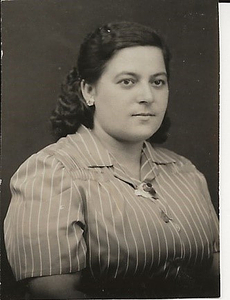University of Massachusetts Lowell, Center for Lowell History
Firmo Correa Family Collection [1921-1980]
The Firmo Correa Family Collection is a unique look into multiple generations of one Portuguese-American family. The collection focuses on the children of Firmo and Julia Correa, including many pictures of both their life in Lowell and their time spent back on Madeira.
Biographical Sketch
Firmo Correa, (1887-1964), salesman, businessman, politician, community activist. Born in Funchal, Madeira, Correa was the son of Francisco and Rose (Encarnação) Correa. Little is known of his years growing up in Funchal, but he completed nine grades of schooling, more than most children of his generation. Firmo’s occupation as a young man in Funchal is unknown, but in 1909, at the age of 22, he married Julia J. de Jesus. That same year, perhaps seeking better job opportunities, Firmo departed Funchal arriving in Boston in September, 1909, and settling in Lowell. Across the Atlantic, Julia had their first child, a daughter, Maria, born in Funchal in 1910. It appears that within a year Julia joined her husband in Lowell. Between 1911 and 1923, they had five more children, all born in Lowell: Beatrice (1911), Gabriela (1914), Manuel (1915), Arthur (1920), and Edward (1923).
For several years during this time they lived in a Tilden Street boardinghouse owned by the Tremont-Suffolk Mills. Instead of mill work Firmo found employment as a salesman in men’s clothing. In the early 1920s, however, he struck out on his own, opening the Madeira Grocery on Tilden Street in a building he rented (less than a block from the boardinghouse where he and his family formerly resided), which also served as his family’s home. Although most of the city’s Portuguese lived in the Back Central neighborhood and this location might appear to be an unpromising choice for Portuguese grocery, in fact, a small enclave of mostly Madeirans resided within two to three blocks of Firmo’s business. Nevertheless, the Madeira Grocery proved to be short-lived. Reeling from a declining textile industry and high unemployment, the city experienced a downward economic spiral and many small businesses struggled.
At this time Firmo’s personal life also appeared in disarray. He and his wife separated, with Julia returning to Funchal with the children. For reasons unclear, Firmo legally changed his surname from Encarnação to Correa. He resumed his work as a salesman in men’s clothing, employed in a store owned by a local Jewish businessman, Louis Ginsburg, and located on Central Street. By 1930 Firmo was living in a small room in a boardinghouse on Hanover Street in the shadow of the Nashua Manufacturing Company’s factory (formerly the Tremont-Suffolk Mill). In the U.S. Census of that year he listed himself as unmarried. Yet Correa proved himself a capable and popular salesman. By the early 1930s he worked in one of the city’s most popular retail establishments, the Bon Marché, managing the boy’s and men’s department. Correa also moved into a more fashionable residence on Kirk Street, a short walk from the Bon Marché.
It was during the 1930s that Firmo Correa gained city-wide renown as a leading political activist in Lowell’s Portuguese community. An ardent supporter of FDR and the New Deal, Correa, in 1936, founded the Portuguese-American Democratic Club (PADC). He enlisted the support of a number of locally prominent Portuguese, as the club’s membership grew into the hundreds. Notable as well, unlike other ethnically based political clubs in Lowell, which allowed only male members to be organizational officers, the PADC included women and men, with several women, including Laura Pacheco (1915-2002) and Mary E. Teixeira (1912-1973), holding leadership positions. They organized political rallies on behalf of local, state, and national Democratic candidates, with Firmo often serving as host in public halls, attended by hundreds of Lowellians. Local Portuguese musicians performed at some of these rallies that featured not only Portuguese speakers but leaders of other ethnic-based Democratic clubs in the city. Firmo also used the PADC as his base for his candidacy for city council, running three times for an at-large seat in the 1930s and 1940s. The first Portuguese-American to run for elective office in Lowell, Firmo lost each time, finishing near the bottom in the local Democratic primaries.
Although Firmo Correa’s visibility and stature within Lowell’s Portuguese community rose during the Great Depression, one of his business ventures, a notorious bar and liquor store on Tilden Street, tarnished his reputation. Lowell police raided his establishment in 1934 that resulted in a drunken brawl and revealed a number of violations. In a hearing before the city’s liquor licensing commission, Correa disputed the charges while attempting to exonerate himself, testifying that he left an employee in charge of the bar because of his managerial duties at the Bon Marché. Despite his appeal the commission ruled against him, shutting down what police described as bar with among the “worst conditions” in the city.
Clearly, among members of Lowell’s Portuguese community some of the attention Correa attracted was less than flattering (it appears that in his city council races he garnered an unimpressive number of Portuguese votes). But he energetically promoted Portuguese culture and education. He led a campaign to have the Portuguese language taught in the public high school as well as in adult educational classes in the evening schools. Correa also promoted naturalization programs for Portuguese and was active in the Portuguese-American Civic League. In the 1950s, while an employee of the Commonwealth of Massachusetts, he worked tirelessly to liberalize federal immigration law for Portuguese in the wake of the Capelinhos volcanic eruption on the island of Faial that disrupted the lives of nearly 2,000 Azoreans. Upon his death in 1964, Correa was considered among some in Lowell as the city’s “Portuguese Ambassador.”
